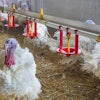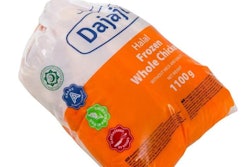
Alternative proteins are experiencing significant growth. As fresh meat protein continues to grow at a rate of 1.3%, alternative proteins are growing by 10.3%.
“This growth is driven by people who love eating meat,” Tyson Foods Executive Vice President, Alternative Proteins & Chief Sustainability Officer Justin Whitmore said during the Tyson Foods Inc. Investor Day webinar on Thursday, June 20.
Whitmore said the growth of plant-based protein demand is not confined to the coasts, big cities or to the youngest among us. Tyson's insights team has determined that the U.S. consumer demanding alternative protein is driven by three buying decisions: the perception of health and well-being, taste and convenience, and sustainability. Whitmore noted that sustainability is most important to millennials and Generation Z.
“What is most exciting about the shape of this demand for Tyson Foods is that 75% of all consumers are open to or actively adding plant-based protein to their diet and nearly all of them will continue to eat our traditional meat products,” he said.
The company’s initial analysis of buying behaviors suggest that this category is among the most “incremental to our business that we have seen, which if you read the news, would not be apparent,” Whitmore said.
Why does Tyson believe it will have the upper hand?
Tyson Foods made internal and venture capital investments to learn what it could about the alternative protein market.
“These investments helped create a clear picture of the core capabilities required to lead,” Whitmore said. The four capabilities needed and what he feels will give Tyson the upper hand are culinary expertise, brand-building leadership, supply chain and customer relationships.
“Over time, this market will be about great-tasting food rather than science,” he said, thus making the company’s culinary team crucial to its success in the market.
As the company assessed the competitive brand environment, it took a hard look at how it could generate brands that resonate with consumers.
“What emerged from our assessment was another moment where the 2014 acquisition of Hillshire brands is creating differentiated value. Not only have we been able to create a new brand (Raised and Rooted), but we have a host of flagship brands across our portfolio that are winning in the marketplace,” he said. This allows the company to appeal to multiple demographics.
The third area where the company believes it will be able to differentiate in this space and potentially lead is its supply chain.
“We have embedded relationships and infrastructure across the entire alternative protein supply chain from farm to fork,” he said. He noted that smaller players may struggle to meet the scale of the growing demand.
“There are several geographies around the world that are demonstrating similar demand characteristics and, as our international business expands, we have the ability to leverage our global assets and global sales relationships to provide plant, blended and traditional protein options to consumers around the world,” he said.
His final point in why the company will potentially lead the industry in this growing trend was the consumer relationships it has established over years of business.
“People will not have to change who they are or how they shop to enjoy our products," he said. There are "no three- to five-year ramp-up plans. We can do this as fast or faster than anyone.”
According to the WATTAgNet Top Poultry Companies Database, Tyson Foods Inc. is an international food company focused on animal protein based in Springdale, Arkansas. The company supplies retail and foodservice customers throughout the United States and approximately 115 countries. It employs approximately 122,000. In its fiscal 2018, Tyson’s total operations generated $40.1 billion in sales. By segment, sales broke down to approximately 39% beef, 30% chicken, 22% prepared foods, 12% pork and less than 1% other.

















